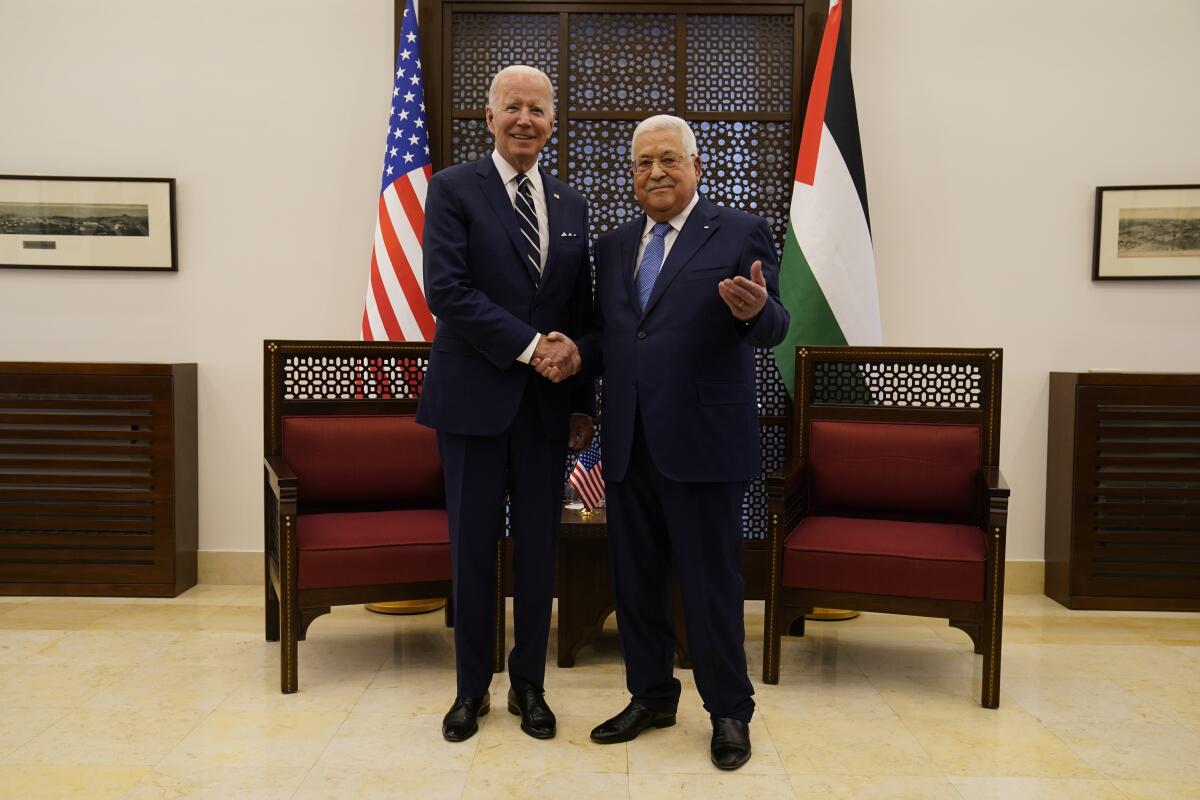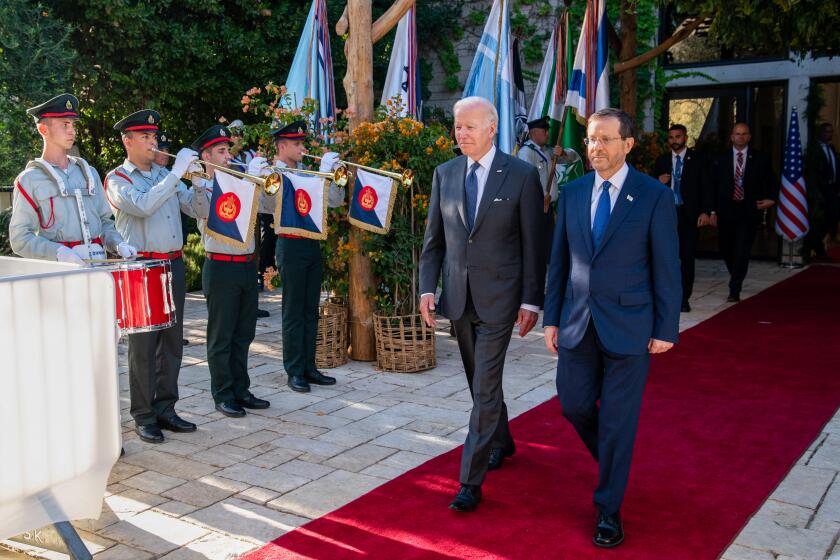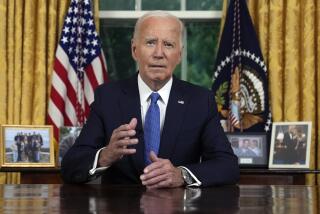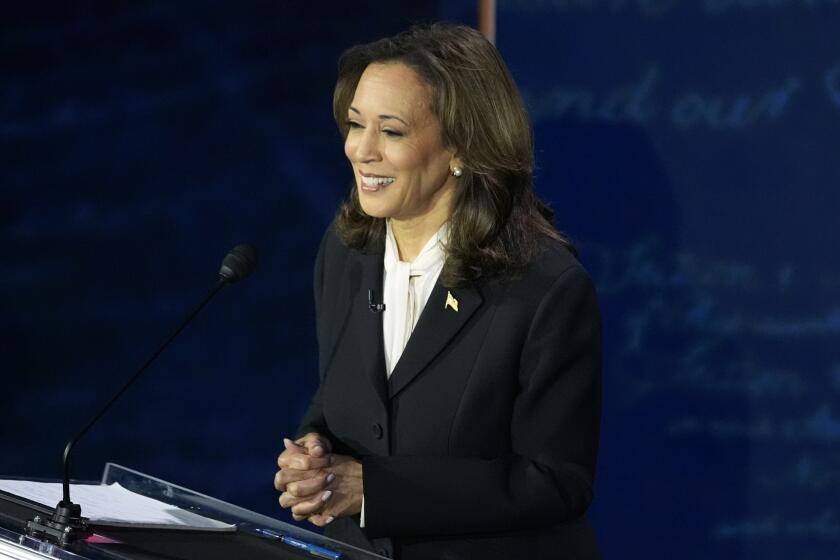Biden endorses Palestinian state but admits it’s ‘far away’

JERUSALEM — President Biden on Friday endorsed an independent Palestinian state, although he conceded that such a historic development was “far away” and acknowledged the despair of the Palestinian people long frustrated in their fight for equal rights.
“Even if the ground is not ripe at this moment to restart negotiations, the United States and my administration will not give up on bringing the Palestinians and the Israelis, both sides, closer together,” Biden said during a joint appearance with Palestinian Authority President Mahmoud Abbas in Bethlehem.
“I know that the goal of the two states seems so far away while indignities like restrictions on movement and travel or the daily worry of your children’s safety are real and they are immediate,” Biden added. “The Palestinian people are hurting now. You can just feel it. Your grief and frustration. In the United States, we can feel it.”
Biden’s remarks were unlikely to salve Palestinians’ frustrations with U.S. policy. They are irked, in particular, that Biden has not reversed the Trump-era actions, including the former president’s declaration that Jerusalem is the capital of Israel. That was a controversial decision because Palestinians claim part of the contested holy city as the capital of an eventual state. They are also angry that Israeli settlers have been steadily claiming land that would complicate their ability to govern an eventual independent nation.
“Peace begins with Palestine and Jerusalem,” Abbas said. After decades of Israeli control, the Palestinian leader said, “is it not the time for this occupation to end and for our steadfast people, again, to gain their freedom and independence?”
Biden’s closed-door meeting with Abbas in a Bethlehem government compound included numerous other Palestinian officials, including Hussein Sheikh, a senior member of the Palestine Liberation Organization often mentioned as the aging Abbas’ successor.
President Biden met with the Saudi royal family in Jidda on Friday, after having said he would marginalize the oil-rich kingdom. He said he confronted Saudi Crown Prince Mohammed bin Salman over the slaying of journalist Jamal Khashoggi.
The four hours that Biden spent in Bethlehem and East Jerusalem was the only nod to Palestinians on the president’s itinerary during a four-day trip to the Middle East that featured meetings with the leaders of Israel, Saudi Arabia and other nations.
As he entered Bethlehem, Biden was met with large signs saying, “Mr. President, this is apartheid,” which had been erected by an Israeli human rights group. Portraits of slain Palestinian American journalist Shireen abu Akleh also appeared on the walls of some buildings along the roads into Bethlehem.
Journalists attending a joint appearance by Biden and Abbas also took a symbolic step to draw attention to the killing by leaving an empty chair in the press area. Abu Akleh was killed, most likely by Israeli forces, while covering an Israeli military raid in the West Bank town of Jenin on May 11. Her death and the U.S. reluctance to blame Israel has infuriated Palestinians.
Biden said in his joint appearance with Abbas that the U.S. government “will continue to insist on full and transparent accountability for her death.”
“Her death is an enormous loss to the essential work of sharing with the world the story of the Palestinian people,” he added.
The Palestinian statehood issue is not on the agenda in Biden’s first Middle East trip as president, adding to anger over Al Jazeera reporter’s death.
Expectations were low even before Biden arrived. The Biden administration has renewed diplomatic ties with the Palestinians and restored financial aid, both of which had been severed by former President Trump. But the White House has not reversed other Trump actions, failing, for example, to reopen the U.S. Consulate in East Jerusalem, which had served Palestinians and was closed by Trump.
National security advisor Jake Sullivan, speaking to reporters Friday on Air Force One on the way to Saudi Arabia, said Biden and Abbas discussed the consulate and said U.S. officials “continue to engage” with Palestinians and Israelis. But in 18 months, there has been no movement.
“I think we’re expecting too much from [Biden] regarding Palestine,” Palestinian writer Mariam Barghouti said Friday on Twitter. “Older than the State of Israel, his ideology is from the era of colonial conquest. I don’t think that’s something that will change at this point.”
In Bethlehem, Biden also toured the Church of the Nativity with several clerics who explained the elaborate mosaics and Byzantine architecture. Christian tradition holds that a small grotto under the center of the ancient church marks the birthplace of Jesus.
The White House said Biden’s visit to the church was meant to signal support for Christians throughout the region who have faced attack and displacement. Palestinians are among the last indigenous Christians who remain in the Holy Land, but many have immigrated to the U.S., Latin America and other countries.
In first trip to the Middle East as president, Biden faces tough talks on Iran, oil and security.
Earlier Friday, Biden toured the Augusta Victoria Hospital, part of the East Jerusalem Hospital Network, which serves as the “backbone” of healthcare for Palestinians, as Biden put it. Its U.S. funding was cut by Trump, and Biden pledged $100 million in new money.
A woman in the audience, who identified herself as a nurse, told Biden: “Thank you for your support, but we need more justice, we need more dignity.”
Bierman reported from Jerusalem and Wilkinson from Washington.
More to Read
Get the L.A. Times Politics newsletter
Deeply reported insights into legislation, politics and policy from Sacramento, Washington and beyond. In your inbox three times per week.
You may occasionally receive promotional content from the Los Angeles Times.















